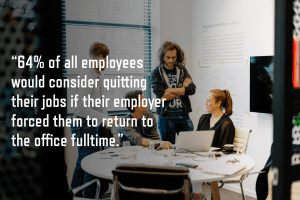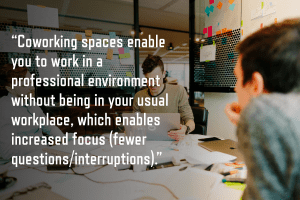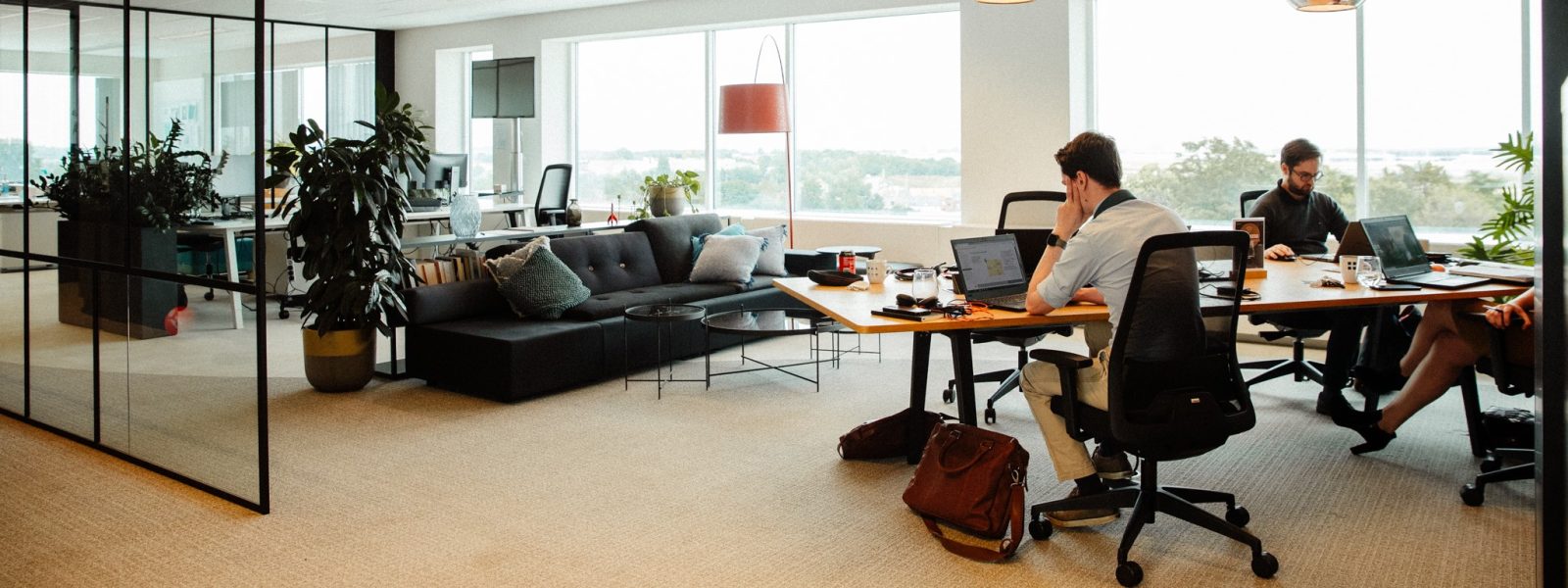3 scenarios for work organisation during the hybrid revolution
on 25 October 2022 for CompaniesIn the aftermath of the pandemic, companies need a new vision for the organisation of work. Remote working offers an opportunity to increase employee engagement, productivity, well-being and retention in one fell swoop. How? By organising work around the motivation of workers.
Today, employees want more autonomy – not only in their place of work, but also in how, when and on what they work. Productivity can best be evaluated based on results, not on presence in the office. The 9 to 5 office culture dates back to the industrial revolution, and anno 2022, it could really use an update. Besides, ensuring that your central focus is on people can distinguish you from other companies in a labour market experiencing shortages.

The hybrid revolution
The invention of electricity has led to the industrial revolution. The invention of the Internet has led to the digital revolution. And now, since the events of 2020, we’re in the midst of the hybrid revolution. How you deal with this is of course entirely up to you, although we would advise a certain approach over others. What follows is an exposition of 3 possible scenarios for the organisation of work during the hybrid revolution.
Scenario 1 : Revert to the way things were in the previous decade.
Maybe you’re considering a return-to-office mandate for all employees. You might say, if Elon Musk is doing it, it must be a good idea, right? Wrong. Only 3% of office employees want to return to the office five days a week, and in a labour market where jobs are plentiful and talent is scarce, the power lies with the workers. Moreover, according to a global survey by the ADP Research Institute, 64% of all employees would consider quitting their jobs if their employer forced them to return to the office fulltime.
Remote working feels natural to those generations that grew up with technology – that’s why resistance to returning to the office fulltime is strongest among younger employees. An office pool table or darts board and catered lunches don’t suffice anymore to engage young people to come into the office. They need to feel it’s worth it to get up earlier and commute to work – that they’re getting something out of the extra effort – or else they just won’t do it. They don’t need to – they can find more flexible work schedules elsewhere. That’s why it’s important to emphasise value of the office as a place where employees can socialise with co-workers and get valuable mentorship from more experienced professionals.
Scenario 2 : Adapt a dual hybrid working environment
So far, remote working has been organised around two locations: working in the office, and working from home. This is how most businesses are still approaching workplace organisation today. However, our experiences of the past two years have shown that working from home has its problems and limitations. When work time and personal time all blend into one physical space, it’s more difficult to distinguish between the two. Furthermore, the presence of family members or children can be an assault on our concentration. Feeling the need to be available around the clock can be exhausting, risking an increase of worker fatigues and burn-outs and a decrease of productivity.

You can create a balance between days in the office and days working from home, but a lot of people face long commutes which also cut into their work/life balance, while the crowded open space offices might make it hard to focus as well. So then what can you do? There’s a third scenario to consider, one that we believe is the best option.
Scenario 3 : Taking the human factor into consideration
We advise you to use third-party premises or hubs, in addition to working in the office and working from home. This approach has been researched by Xwork, in collaboration with the Solvay Business School. For over one month, employees of ten large Belgian companies had the opportunity to go to coworking spaces of their choice. The results were fascinating.
- 76% of participants reported that adding hubs to their hybrid organisation of work enabled them to have a better work/life balance. This number increased to a whopping 90% for participants under 30 years of age!
- 83% believed that coworking helped to escape the feelings of isolation they experience when working from home.
- 64% said that they adhered more closely to normal working hours in a coworking space, compared to at home.
- 42% of participants reported an improvement in the quality of their work thanks to the variety of workspace, because it allows them to choose their work setting according to the nature of their task (activity-based working).
Here’s what participants said about the trial:
- “Coworking spaces enable you to work in a professional environment without being in your usual workplace, which enables increased focus (fewer questions/interruptions).”
- “A separation between work life and private life makes it possible to have 100% focus during working periods, rather than 80% over a longer period, as can be the case with teleworking.”
- “It’s very difficult to stop when the children come home, for example. You are therefore less efficient and tend to continue working in the evening. There is no break. When it comes to the office, the commute and the conversations at the end of the day delay the return home and therefore reduce the work/life balance.”
Conclusion
The organisation of work needs to match the new expectations of workers and their working practices. Employees want autonomy and fle xibility in when, where, how and on what they work. While returning to the office fulltime is out of the question, and working from home offers issues of its own, working in a coworking space near home can be an attractive and efficient form of remote working. Adding third-party premises to your organisation of work can distinguish you as an attractive employer who offers trust and flexibility to its employees and puts people first.
About Exellys
Exellys is a Tech Talent Incubator. We bring tech talent into the daily operations of the organisation of our customers and grow them for the innovations of tomorrow.
From the 1.500 tech talents we speak to annually, we select the top 7%. We intensively train and coach them on the right skills and competences. Our (scientifically based) training programs (Start Smart, Grow Smart & Lead Smart) accelerate the growth of our talents, and therefore also the growth of our customers.
We “unburden” our clients when looking for and retaining tech talent. We are committed to getting the best out of talent, while our customers can continue to focus on their core business.
We do this for organisations who want to strengthen their team permanently, as well as those who are looking for a flexible, project-driven solution. Get in touch with us today and find out how we can help.
Tags: home working , innovation , office , productivity , talent retention





